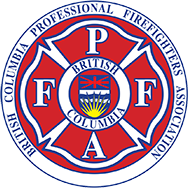For immediate Release:
On April 22, 2022, the BC Government officially announced the expansions to the presumptive occupational disease coverage for fire fighters in BC.. The changes to Workers Compensation Act received royal assent on March 31, 2022. This includes the following cancers now presumptively covered: Ovarian, Cervical, and Penile, along with reduced latency periods for Testicular and Colorectal Cancers (from 20 years to 10 years accumulation period); and Esophageal Cancer (from 25 years to 20 years).
BC Provincial Government Announcement Regarding Presumptive Cancer Coverage
On Monday, March 7, 2022, during the 11th Annual Robert E. Hall Legislative Virtual Conference Premier John Horgan and the Honourable Minister Harry Bains announced these expansions to the 100 IAFF delegates in attendance.
President Ditchburn says, “We are extremely thankful for the support of Premier Horgan, Minister of Labour Bains and all of Government in announcing the expansion of the presumptive list of occupational diseases recognized by WorkSafeBC — two of which are female cancers, cervical and ovarian. Our women fire fighters who are on the frontlines must be recognized, and we stand with them in our collective provincial advocacy for health, safety and support for all members. Further to this, the reduction in cumulative latency periods for Colo-rectal, Testicular and Esophageal cancers proves the government is listening and acting. This adds to our list of occupational diseases, which will now have eighteen illnesses/diseases as being recognized by the Workers Compensation Act, in being related to the profession of fire fighting.”
Cancer is an epidemic in Canada’s Fire Service. Fire fighters have two-and-a-half times the risk of developing cancer and acute coronary syndromes than the general population. Fire fighters face chronic exposure to heat, smoke, diesel exhaust, and toxic flame retardants. These carcinogenic chemicals are absorbed, inhaled, and ingested into the fire fighters’ skin, airways, and gastrointestinal system at building fires, car fires, dumpster fires, even kitchen fires. Carcinogens also accumulate on and inside the fire fighters’ protective bunker gear and in their fire stations.
Secretary Treasurer Todd Schierling goes on to say, “This announcement demonstrates that the BC government is listening and acting! We have much more work to do in the area of prevention and education to ensure Fire Departments are following best practices to reduce exposures for fire fighters. The BCPFFA Occupational Health and Safety committee and local leaders continue to build resources and work with partners like WorkSafeBC, International Association of Fire Fighters (IAFF) and Fire Fighter Cancer Support Network (FCSN).”
According to the IAFF, cancer is by far the number one cause of fire fighter line of duty deaths in Canada with more than 400 Canadian IAFF Fire Fighters succumbing to the disease as a direct result of their duties over a 10 year period (2012 to 2022).
Since 1987, 89 (eighty-nine) of the 151 (one hundred and fifty one) BC Fire Fighter Line of Duty Deaths listed here have occurred as a result of Occupational Cancer. Their families have received compensation benefits through WorkSafeBC, made possible by Government Legislation. The compensation although minimal overall does provide compensation to families in the loss of their loved one. The Federal Government also recognizes Line of Duty Deaths with a Memorial Grant Program for First Responders.
With the addition of the 3 cancers (Ovarian, Cervical and Penile) there are 16 presumptive cancers, plus heart injury/disease and Operational Stress Injury (OSI) recognized by WorkSafe for BC Fire Fighters.
Occupational Disease and Minimum Employment Years
Primary Site Leukemia - 5 years
Primary Site Brain cancer - 10 years
Primary Site Colorectal cancer - 10 years
Primary Site Testicular cancer - 10 years
Primary Site Breast cancer - 10 years
Primary Site Ovarian cancer - 10 years
Primary Site Cervical cancer - 10 years
Primary Site Penile cancer - 10 years
Primary Site Prostate cancer - 15 years
Multiple Myeloma cancer - 15 years
Primary Site Bladder cancer - 15 years
Primary Site Ureter cancer - 15 years
Primary Site Non-smoker’s Lung cancer - 15 years
Primary site Esophageal cancer - 20 years
Primary Site Kidney cancer. - 20 years
Primary Site Non-Hodgkin’s lymphoma - 20 years
Operational Stress Injury - N/A
Heart Disease & Heart Injury - N/A
-30-
For more information
Contact BCPFFA OFFICE
Ph: 604.436.2053
ABOUT ROBERT E. HALL
Robert was a fire fighter with Vancouver, Local 18 and he was a leading voice as BCPFFA Secretary-Treasurer in a decade-long lobby to have the BC Government recognize health risks in fire fighters. On October 31, 2005 Robert led us to the Legislature in Victoria and sat in the public gallery for the first reading of the Worker's Compensation Amendment Act. It recognized 7 cancers as occupational diseases for fire fighters {Brain, Bladder, Colorectal, Kidney, Ureter, Primary non-Hodgkin's Lymphoma, and primary leukaemia}. Since then, Testicular, Lung, Esophageal, Prostate, Breast and Multiple Myeloma cancers and Heart Disease have been added as presumptive.
On August 27, 2007 Rob succumbed to Occupational Cancer. BC Fire Fighters will be forever grateful of his leadership and vision in working with the provincial government to recognize and improve fire fighters' health and safety.
With the recent announcement, the Workers Compensation Act will recognize eighteen occupational diseases as being related to the profession of fire fighting.
Delegation and guest government speakers at the 11th Annual Robert E. Hall Virtual Conference

